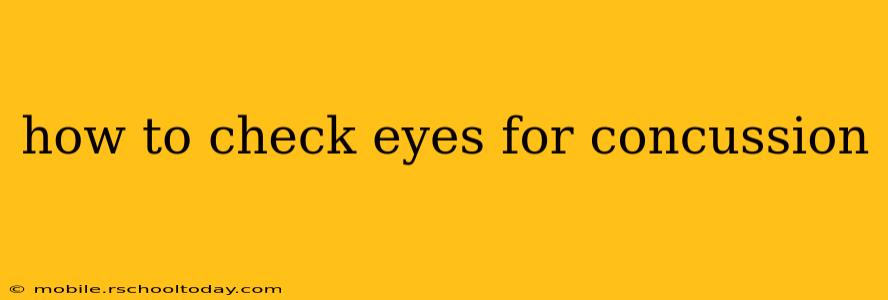How to Check Eyes for Concussion: Recognizing Subtle Signs of Brain Injury
A concussion, also known as a mild traumatic brain injury (mTBI), can cause a wide range of symptoms, many of which are subtle and easily overlooked. While a doctor should always be consulted for a proper diagnosis, understanding how to assess the eyes for potential concussion indicators can be crucial in the immediate aftermath of a head injury. This isn't a substitute for professional medical evaluation but can help identify individuals who need urgent medical attention.
Important Note: This information is for educational purposes only and does not constitute medical advice. If you suspect a concussion, seek immediate medical attention.
What are the Eye Symptoms of a Concussion?
Concussions frequently affect the oculomotor system, which controls eye movement and coordination. Looking for these subtle changes can be key to early detection. The key is to compare the injured eye's performance to the uninjured eye.
1. Pupillary Response: Unequal pupil size (anisocoria) or sluggish pupillary response to light can indicate increased intracranial pressure, a serious complication of a concussion. This is best assessed by a medical professional with appropriate equipment.
2. Visual Acuity: A noticeable reduction in visual acuity (sharpness of vision) in one eye compared to the other may suggest brain injury. This isn't something you can easily test at home without an eye chart, but a significant difference is something to report to a doctor.
3. Eye Movement: Difficulty with eye tracking (following a moving object smoothly), double vision (diplopia), or nystagmus (involuntary eye movements) are potential signs. Ask the person to follow your finger as you move it slowly in an "H" pattern. Jerky movements or inability to smoothly track the finger can be concerning.
4. Convergence: Have the person focus on your finger as you bring it closer to their nose. Difficulty converging their eyes (turning inward) can suggest oculomotor dysfunction.
How to Perform a Basic Eye Exam (For Observational Purposes Only):
This is not a replacement for a medical professional's assessment, but a way to observe potential problems.
- Observe Pupil Size and Reactivity: Compare the size of both pupils in good lighting. Shine a light into each eye individually and observe how quickly they constrict. Any significant difference or sluggish response warrants immediate medical attention.
- Assess Visual Acuity (Rough Estimate): Ask the person to read something at a distance. If they struggle significantly more with one eye than the other, it's a cause for concern.
- Test Eye Tracking: Use a pen or your finger to slowly move it in an "H" pattern, horizontally and vertically, asking the person to follow it with their eyes. Note any jerky movements or inability to track smoothly.
- Check Convergence: Bring your finger slowly toward their nose, asking them to focus on it. Observe if they have difficulty converging their eyes.
What are other symptoms of a concussion?
It's important to understand that eye symptoms are just one piece of the puzzle. Concussions often present with a broader range of symptoms including:
- Headache: Often described as a dull ache or throbbing.
- Dizziness: Feeling lightheaded or unsteady.
- Nausea and Vomiting: Can be severe in some cases.
- Cognitive Issues: Difficulty concentrating, memory problems, confusion.
- Balance Problems: Difficulty walking or standing steadily.
- Sensitivity to Light and Sound: Photophobia and phonophobia.
- Sleep disturbances: Difficulty sleeping or excessive sleeping.
When Should I Seek Medical Attention?
Seek immediate medical attention if you suspect a concussion, especially if you observe any of the following:
- Loss of consciousness.
- Severe headache.
- Seizures.
- Vomiting.
- Worsening symptoms.
- Unequal pupil size.
How is a Concussion Diagnosed?
A doctor will typically perform a neurological exam, including an assessment of the eyes, to diagnose a concussion. Imaging studies such as CT scans or MRIs may be ordered in cases of severe head injury or if there is concern for bleeding in the brain.
Remember: This information is for educational purposes only. Early recognition and prompt medical attention are crucial in managing a concussion effectively. Always seek the advice of a healthcare professional for any concerns regarding your health.
